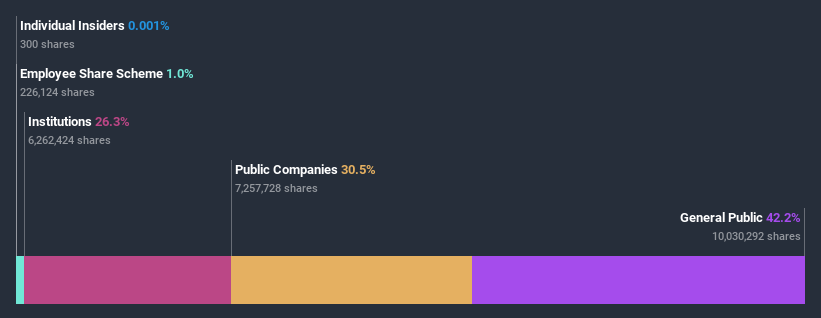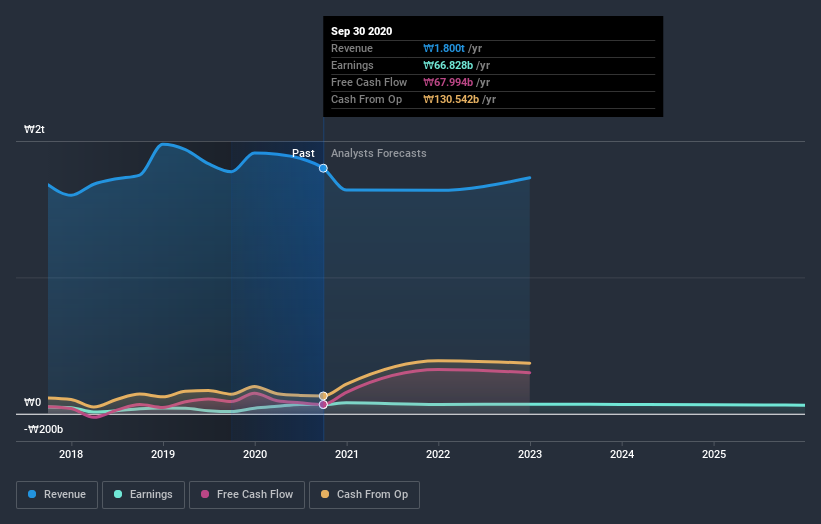- South Korea
- /
- Paper and Forestry Products
- /
- KOSE:A213500
Could The Hansol Paper Co., Ltd. (KRX:213500) Ownership Structure Tell Us Something Useful?
The big shareholder groups in Hansol Paper Co., Ltd. (KRX:213500) have power over the company. Institutions often own shares in more established companies, while it's not unusual to see insiders own a fair bit of smaller companies. Companies that have been privatized tend to have low insider ownership.
Hansol Paper is not a large company by global standards. It has a market capitalization of ₩319b, which means it wouldn't have the attention of many institutional investors. Our analysis of the ownership of the company, below, shows that institutional investors have bought into the company. We can zoom in on the different ownership groups, to learn more about Hansol Paper.
Check out our latest analysis for Hansol Paper

What Does The Institutional Ownership Tell Us About Hansol Paper?
Many institutions measure their performance against an index that approximates the local market. So they usually pay more attention to companies that are included in major indices.
We can see that Hansol Paper does have institutional investors; and they hold a good portion of the company's stock. This can indicate that the company has a certain degree of credibility in the investment community. However, it is best to be wary of relying on the supposed validation that comes with institutional investors. They too, get it wrong sometimes. If multiple institutions change their view on a stock at the same time, you could see the share price drop fast. It's therefore worth looking at Hansol Paper's earnings history below. Of course, the future is what really matters.

Hedge funds don't have many shares in Hansol Paper. Hansol Holdings Co., Ltd. is currently the company's largest shareholder with 31% of shares outstanding. With 8.0% and 5.1% of the shares outstanding respectively, National Pension Service and Shinyoung Asset Management Co., Ltd. are the second and third largest shareholders.
We did some more digging and found that 6 of the top shareholders account for roughly 51% of the register, implying that along with larger shareholders, there are a few smaller shareholders, thereby balancing out each others interests somewhat.
Researching institutional ownership is a good way to gauge and filter a stock's expected performance. The same can be achieved by studying analyst sentiments. There is a little analyst coverage of the stock, but not much. So there is room for it to gain more coverage.
Insider Ownership Of Hansol Paper
The definition of an insider can differ slightly between different countries, but members of the board of directors always count. The company management answer to the board and the latter should represent the interests of shareholders. Notably, sometimes top-level managers are on the board themselves.
Most consider insider ownership a positive because it can indicate the board is well aligned with other shareholders. However, on some occasions too much power is concentrated within this group.
Our information suggests that Hansol Paper Co., Ltd. insiders own under 1% of the company. It appears that the board holds about ₩4.0m worth of stock. This compares to a market capitalization of ₩319b. I generally like to see a board more invested. However it might be worth checking if those insiders have been buying.
General Public Ownership
With a 42% ownership, the general public have some degree of sway over Hansol Paper. While this size of ownership may not be enough to sway a policy decision in their favour, they can still make a collective impact on company policies.
Public Company Ownership
It appears to us that public companies own 31% of Hansol Paper. This may be a strategic interest and the two companies may have related business interests. It could be that they have de-merged. This holding is probably worth investigating further.
Next Steps:
I find it very interesting to look at who exactly owns a company. But to truly gain insight, we need to consider other information, too. To that end, you should learn about the 3 warning signs we've spotted with Hansol Paper (including 2 which make us uncomfortable) .
If you would prefer discover what analysts are predicting in terms of future growth, do not miss this free report on analyst forecasts.
NB: Figures in this article are calculated using data from the last twelve months, which refer to the 12-month period ending on the last date of the month the financial statement is dated. This may not be consistent with full year annual report figures.
If you decide to trade Hansol Paper, use the lowest-cost* platform that is rated #1 Overall by Barron’s, Interactive Brokers. Trade stocks, options, futures, forex, bonds and funds on 135 markets, all from a single integrated account. Promoted
Valuation is complex, but we're here to simplify it.
Discover if Hansol Paper might be undervalued or overvalued with our detailed analysis, featuring fair value estimates, potential risks, dividends, insider trades, and its financial condition.
Access Free AnalysisThis article by Simply Wall St is general in nature. It does not constitute a recommendation to buy or sell any stock, and does not take account of your objectives, or your financial situation. We aim to bring you long-term focused analysis driven by fundamental data. Note that our analysis may not factor in the latest price-sensitive company announcements or qualitative material. Simply Wall St has no position in any stocks mentioned.
*Interactive Brokers Rated Lowest Cost Broker by StockBrokers.com Annual Online Review 2020
Have feedback on this article? Concerned about the content? Get in touch with us directly. Alternatively, email editorial-team (at) simplywallst.com.
About KOSE:A213500
Hansol Paper
Produces, distributes, and sells paper products in South Korea and internationally.
Undervalued with moderate growth potential.
Market Insights
Community Narratives



